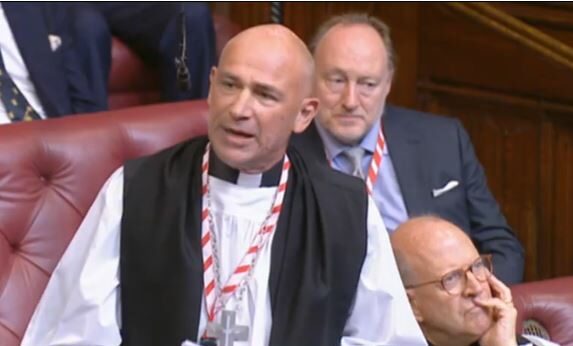As the Bishop of Sheffield gears up this autumn to chair the public inquiry into the ‘Battle of Orgreave’ in South Yorkshire during the 1984 miners’ strike, the view onto his own diocesan backyard is not particularly pretty. This raises a serious question about whether Church of England bishops should be taking on time-consuming civic roles.
The Labour Government announced in July that it had appointed Dr Pete Wilcox to chair the statutory inquiry into ‘the violent confrontation between police, picketers and subsequent protesters at Orgreave 41 years ago’.
The Government announcement said: ‘The inquiry, expected to launch in the autumn, will investigate the events surrounding clashes at the Orgreave Coking Plant in 1984, causing 120 injuries. In total, 95 picketers were arrested and initially charged with riot and violent disorder, but all charges were later dropped after evidence was discredited. The inquiry will be statutory, with the appropriate powers to compel people to provide information where necessary.’
It is not clear what the time commitment will be for Bishop Wilcox. The Independent Panel reviewing the 1989 Hillsborough football stadium disaster, which the Labour Government in 2009 appointed the then serving Bishop of Liverpool, James Jones, to lead, took two years to produce its report. So, given the complexity of the task ahead, the Orgreave Inquiry is likely to take up a considerable amount of Bishop Wilcox’s time.
Since he became Bishop of Sheffield in 2017, the all-age average Sunday attendance in his diocese fell by almost a quarter from 13,400 to 10,200 in 2023 out of a South Yorkshire population of around 1.3 million. The C of E has not yet published the 2024 attendance figures from each diocese. But from 2017 to 2024, attendance fell by about the same proportion across the C of E, from 757,000 to 582,000.
So, the steep attendance decline in Sheffield Diocese does not especially single Bishop Wilcox out as presiding over a worse situation than in the C of E generally, caused by its failure to recover from the closure of churches during the 2020 Covid lockdown.
But Bishop Wilcox has been cutting the number of parish clergy and increasing the number of clergy employed in central roles, according to data provided by Sheffield Diocese. In 2017, there were 118 stipendiary (paid) parish ministers including incumbents and assistant clergy. By 2025 that had fallen to 107 with the number of incumbents cut from just over 100 in 2017 to 80. In 2017 there were nine paid clergy in central roles, including two archdeacons. By 2025, that had increased to 18 with six Associate Archdeacon Transition Enablers (AATEs) on the payroll.
A diocesan spokeswoman insisted the AATEs ‘are working in the frontline deployed in parishes every day’. In the Bishops’ statement on the advertisement for a new AATE in March 2024, on an annual salary of £38,300 (about £8000 more than a vicar earns) plus tied housing, Bishop Wilcox and the suffragan Bishop of Doncaster, Sophie Jelley, were calling for “someone who will support, encourage, mentor and coach the clergy to be transition (sic) to the Oversight Minister role and support those who have already made this transition”. Does this not suggest that the role of the AATE is to try to persuade parishes that cutting the number of incumbents is good for business?
Be that as it may, at the very least it can be argued that the Sheffield strategy of cutting parish clergy and upping the number of central or roving posts is not helping the diocese to buck the general attendance trend across the C of E.
Bishop Wilcox’s diocese has a concentration of large evangelical churches in the south-west of Sheffield such as Christ Church Fulwood, St Thomas Crookes, and All Saints Ecclesall. Christ Church Fulwood, a conservative evangelical parish, has been particularly pro-active in supporting ‘church grafts’ in South Yorkshire. Over the past 15 years, various parish churches have been boosted by a group from Fulwood joining them, often led by an ordained member of the Christ Church staff team, in communities such as Endcliffe, Gleadless, Wheatley and Oughtibridge.
Christ Church Fulwood is strongly opposed to the services of same-sex blessing, which the C of E’s General Synod voted for in 2023. Bishop Wilcox initially voted for the motion which looked forward ‘to the House of Bishops further refining, commending and issuing the Prayers of Love and Faith’.
But in October 2023 he put his name to a robust statement signed by 12 bishops dissenting from the House of Bishops’ decision to commend the services.
By joining the dissenters, Bishop Wilcox has avoided damaging relations with the pro-active church planting parishes in his diocese which uphold the traditional Anglican teaching on sexual morality. But with his upcoming Orgreave commitment will he have the time properly to support the new ventures these evangelical churches are wanting to launch in moribund parishes around South Yorkshire?
Synod representatives, Parochial Church Councils and clergy in Sheffield Diocese concerned about the potential distraction still have time to petition Bishop Wilcox to reconsider his Orgreave commitment. This is a separate issue from whether they back the Orgreave Inquiry in principle. Many such clergy and laity may well want the inquiry to go ahead but believe that it should be chaired by someone else because of the enormous missional challenge their diocese faces.
The question remains amidst the desperate crisis for the established Church: should not its bishops intentionally avoid time-guzzling civic roles handed to them by politicians in the glare of publicity and instead concentrate on being ‘servants of the servants’ in their own dioceses?
Julian Mann, a former Church of England vicar in Sheffield Diocese, is an evangelical journalist based in Lancashire, UK.
